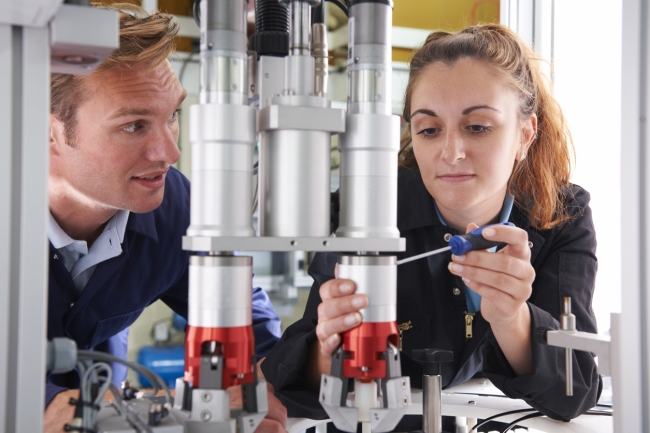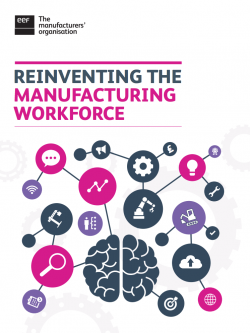2 minute read with link to full report
Manufacturers must up-skill existing workforce in the new digital age
Manufacturers will have to raise their game to use their shrinking workforce better and smarter to cope in an ever-changing world of automated technologies, according to new research by EEF, the manufacturers’ organisation.
Business leaders will have to be more innovative in their use of the existing employees by implementing retraining schemes in key development areas such as AI and digital innovation. This must be done at speed to combat the shrinking talent pool.

New EEF research shows manufacturers have to modernise working practices to survive in a post-Brexit world / Picture: Getty/iStock
Initiating a proper workforce plan – which analyses employees’ skills and where they can be used to best effect – ensures the best use of available human capital. This will become ever more important in the face of increased restrictions on EU workers post-Brexit, according to EEF’s latest report Reinventing the Manufacturing Workforce. A properly thought out workforce plan also helps identify those employees which will benefit most from the opportunity to retrain and up-skill in the latest digital technologies.
However, only 32% of manufacturers surveyed had a workforce plan (a plan with measurable actions that align the changing needs of the business with their people strategy) in place, while almost two-thirds (64%) did not.
The report reveals that 69% of those surveyed said that the adoption of new technologies and techniques is driving the priorities of their workforce plan, while nearly half (44%) said that the introduction of new products is the main driver for change in workforce practices.
To prepare to secure the skills they need for the future a heartening 72% of businesses revealed that they are introducing or continuing to run formal apprenticeships, while half (48%) are revising their recruitment strategy to recruit workers from other industries and sectors with transferable skills.
Others are introducing or continuing with popular graduate programmes to grab the best potential talent while just over a quarter (26%) are revising their workforce plan.

Just 32% of manufacturers have a proper workforce plan in place to make the most of their employees as business changes / Picture: Getty/iStock
Flexible ways of working have already been adopted by all but 15% of manufacturers to non-production employees and 7% to their production employees, which has helped to retain existing employees (74%) and also attract prospective employees (56%).
Tim Thomas, Director of Employment and Skills at EEF said: “Manufacturers are facing both a turbulent but also revolutionary time. Brexit is now on the horizon, bringing with it challenges around access to people. Planning for these changes is vital, yet only a relatively small number of manufacturers have a workforce plan in place.
“Planning is crucial not just to prepare for these challenges but also to take advantage of future opportunities. Technological change has the potential to radically change the workplace in ways never before seen. People will be at the heart of this, adapting not only to new ways of working, but also to new work, requiring a step change in the way employers train their workforce and deploy their skills.
“Manufacturers have over time proved themselves to be adaptable, innovative and resilient. They have the tools and talent to make to make a success of the rapidly changing work they face, but they need government’s backing in creating the right business environment and developing policies within which they can thrive.
